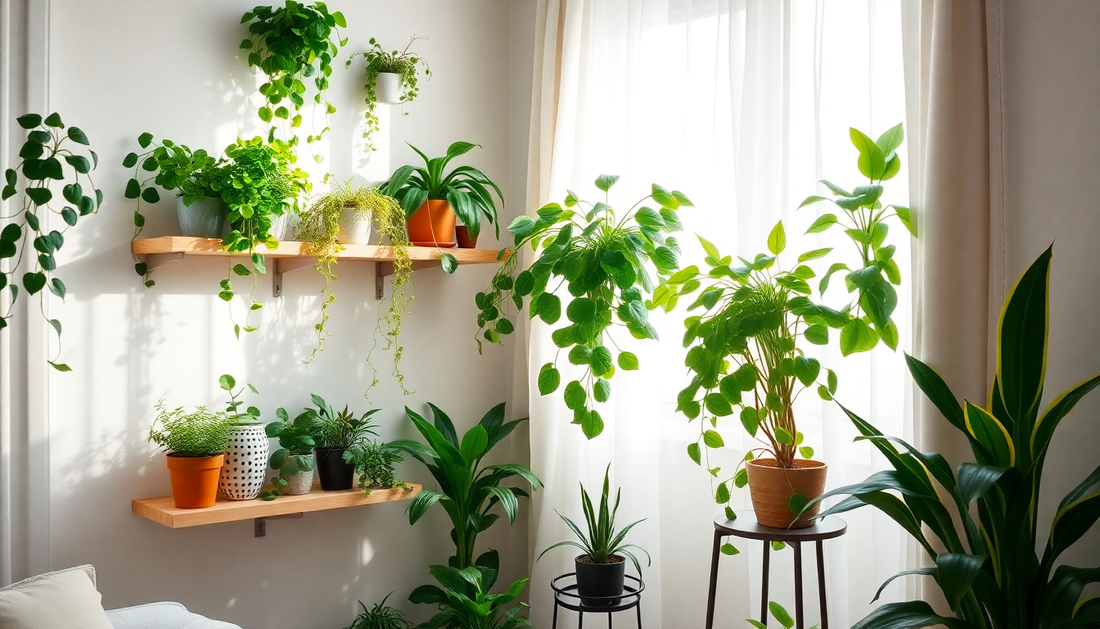
Tiny Spaces, Big Impact: The Best Indoor Plants for Small Homes
Share
In the bustling city of Bangalore, where space is at a premium, finding the perfect indoor plants to breathe life into your home can be a challenge. But fear not, Idyl, your one-stop shop for all things gardening, is here to guide you through the world of compact, low-maintenance houseplants that can transform even the tiniest of spaces.
The Benefits of Indoor Plants
Bringing the outdoors in has long been recognized as a powerful way to enhance our living environments. Indoor plants not only add a touch of natural beauty to our homes, but they also offer a wealth of benefits that can improve our overall well-being. From purifying the air we breathe to boosting our mood and productivity, the right indoor plants can make a significant difference in our daily lives.
Improved Air Quality
Many indoor plants are natural air purifiers, absorbing harmful toxins and releasing fresh oxygen. This can be especially beneficial in urban areas where air pollution is a concern. By strategically placing these air-purifying plants throughout your home, you can create a healthier, more rejuvenating living space.
Stress Reduction
Numerous studies have shown that the presence of indoor plants can have a calming effect, reducing stress and anxiety levels. The simple act of caring for a plant can also provide a sense of purpose and connection to nature, which can be particularly valuable in the fast-paced, technology-driven world we live in.
Increased Productivity
Believe it or not, indoor plants can also boost your productivity. The presence of greenery has been linked to improved concentration, creativity, and overall cognitive function. By incorporating plants into your work or study area, you can create a more inspiring and focused environment.
Choosing the Right Indoor Plants for Small Spaces
With so many benefits to consider, it's no wonder that indoor plants have become a must-have for modern homeowners. But when you're working with limited square footage, it's essential to select the right plants that can thrive in compact conditions. Here are some of the best indoor plants for tiny spaces:
Succulents
Succulents, such as echeveria, jade plants, and aloe vera, are the perfect choice for small-space dwellers. These hardy, low-maintenance plants require minimal watering and can tolerate a range of lighting conditions, making them an ideal option for apartments, dorms, or homes with limited natural light.
Air Plants
Air plants, or tillandsia, are a unique and versatile option for indoor gardening. These whimsical plants don't require soil and can be displayed in a variety of creative ways, from hanging terrariums to wall-mounted frames. Air plants are perfect for adding a touch of greenery to small spaces without taking up valuable floor or surface area.
Pothos
The trailing vines of the pothos plant make it an excellent choice for small spaces. This resilient, low-light tolerant plant can be trained to climb up shelves, hang from ceiling-mounted planters, or cascade from high surfaces, adding a lush, verdant touch to any room.
ZZ Plant
The ZZ plant, or Zamioculcas zamiifolia, is a tough, drought-tolerant houseplant that can thrive in a variety of lighting conditions. Its glossy, architectural leaves make it a stylish addition to any space, and its low-maintenance nature makes it perfect for busy homeowners with limited time to devote to plant care.
Snake Plant
Also known as mother-in-law's tongue, the snake plant is a resilient and versatile indoor plant that can tolerate a wide range of lighting conditions and neglect. Its upright, sculptural leaves add a touch of modern elegance to any space, making it a popular choice for small apartments and homes.
Caring for Your Indoor Plants
Once you've selected the perfect indoor plants for your small space, it's important to understand the proper care and maintenance required to keep them thriving. Here are some tips to help you become a successful indoor plant parent:
Lighting
Different plants have varying lighting needs, so it's crucial to research the specific requirements of your chosen species. Succulents and air plants, for example, generally prefer bright, direct sunlight, while pothos and ZZ plants can thrive in lower-light conditions.
Watering
Overwatering is one of the most common mistakes when it comes to indoor plant care. It's important to follow the specific watering needs of each plant, as some, like succulents, require infrequent watering, while others, like pothos, prefer more consistent moisture.
Fertilizing
Providing your indoor plants with the right nutrients can help them grow strong and healthy. Use a balanced, water-soluble fertilizer and follow the instructions on the packaging to ensure you're not over-fertilizing.
Pruning and Grooming
Regular pruning and grooming can help keep your indoor plants looking their best. Remove any dead or damaged leaves or stems, and consider trimming back overgrown plants to maintain their shape and size.
Pest Control
Keep an eye out for common indoor plant pests, such as spider mites, aphids, or mealybugs. Regularly inspecting your plants and taking swift action at the first sign of an infestation can help prevent these problems from getting out of hand.
Bringing It All Together
With the right indoor plants and a little bit of care, you can transform even the smallest of spaces into a lush, verdant oasis. Whether you're decorating a cozy apartment, a cramped home office, or a tiny balcony, the team at Idyl is here to help you find the perfect plants and accessories to suit your needs.
So why wait? Visit Idyl today and let us help you discover the power of indoor plants to enhance your living environment and improve your overall well-being. With our wide selection of compact, low-maintenance options and expert gardening advice, you'll be on your way to creating a thriving, nature-inspired haven in no time.
